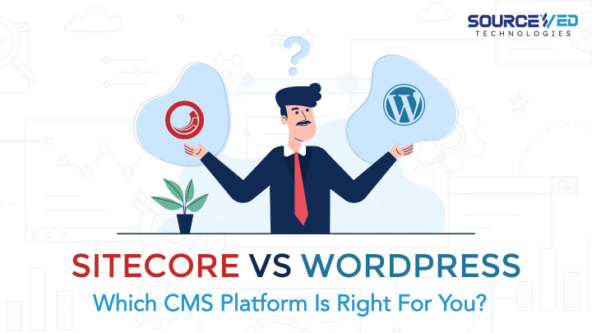Introduction
Selecting the right content management system (CMS) is crucial for the success of your website. When it comes to CMS platforms, Sitecore and WordPress are two popular choices, each with their own strengths and suitability for different types of websites. In this blog, we will compare Sitecore vs WordPress to help you determine which CMS platform is the right fit for your specific needs and requirements.
1. Purpose and Target Audience
Sitecore is a robust enterprise-level CMS designed for complex websites with high scalability and personalization needs. It caters to large organizations and businesses that require advanced features, multisite management, and enterprise integrations. On the other hand, WordPress is a versatile CMS suitable for a wide range of websites, from simple blogs and small business sites to e-commerce stores. If you have specific enterprise-level requirements, Sitecore may be the better choice. For smaller-scale projects, WordPress offers a user-friendly and cost-effective solution.
2. Customization and Flexibility
Sitecore provides extensive customization options, allowing businesses to tailor the platform to their unique requirements. It offers flexibility in terms of content structure, workflows, and integration capabilities, making it suitable for complex implementations. WordPress, known for its vast library of themes and plugins, allows for significant customization. With thousands of themes and plugins available, you can modify the appearance and add functionality to your WordPress website. If you prioritize flexibility and extensive customization, both platforms offer opportunities, but Sitecore’s enterprise-level capabilities give it an edge.
3. Scalability and Performance
Sitecore excels in managing extensive websites with substantial traffic volumes and intricate data structures. Its architecture and caching mechanisms ensure optimal performance even under heavy loads. WordPress, while scalable to a certain extent, may require additional optimization measures for high-traffic sites. If you anticipate significant growth or expect heavy traffic, Sitecore’s enterprise capabilities make it a preferable choice.
4. Content Management Capabilities
Sitecore offers advanced content management features, including complex content structures, personalized experiences, and robust workflow management. It allows for targeted content delivery and optimization through personalization rules. WordPress, while not as feature-rich as Sitecore, provides a user-friendly and intuitive content management interface. It is suitable for bloggers, small businesses, and websites with simpler content management requirements.
5. Support and Community
WordPress benefits from a vast and active community of developers and users worldwide. It offers a wide range of resources, plugins, and themes, making it easy to find solutions and get support. WordPress also receives regular updates and security patches due to its large user base. Sitecore, being an enterprise-level CMS, has dedicated support from the Sitecore community and a network of certified partners. It ensures reliable assistance for complex implementations and integrations.
Conclusion
In conclusion, when deciding between Sitecore and WordPress for your CMS platform, it’s essential to consider your specific needs. Sitecore is ideal for enterprise-level websites with advanced features and scalability requirements. On the other hand, WordPress is versatile and suitable for smaller-scale projects with a user-friendly interface and a wide range of plugins. To ensure a successful implementation, consider partnering with a reputable Sitecore development company that can provide expertise, support, and customization tailored to your business needs.


